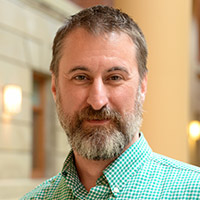The Accreditation Council for Graduate Medical Education (ACMGE) has officially conferred accreditation status—with no citations—on the UW Department of Family Medicine and Community Health’s (DFMCH) multidisciplinary addiction medicine fellowship.

The DFMCH’s addiction medicine fellowship program, led by Randall Brown, MD, PhD, DFASAM (above), received ACGME accreditation, a demonstration of the program’s quality and ability to prepare graduates for practice as addiction medicine physicians.
The accreditation, which is retroactively effective as of July 1, 2018, demonstrates that the program meets ACGME quality standards for preparing graduates for practice as addiction medicine physicians.
A Model Program
Established in 2010 and led by national addiction medicine expert Randall Brown, MD, PhD, DFASAM, the DFMCH’s addiction medicine fellowship is one of the first in the nation to train physicians interested in becoming board certified in addiction medicine.
It was selected as a National Model Program by the American Board of Addiction Medicine in 2011.
The fellowship teaches strategies to prevent, assess and manage patients with substance-use disorders and related illnesses. Specific areas of focus include medication-assisted treatment and models for integrating addiction treatment into primary care.
Fellows gain clinical experience through a continuity practice, outpatient and inpatient consultation clinics, rotations at a residential treatment facility and outreach at University Health Services.
Elevating the Value of Addiction Medicine Education
Several key milestones preceded the fellowship’s accreditation. The first was the American Board of Medical Specialties (ABMS) formally recognizing addiction medicine as a medical subspecialty in March 2016.
There also needed to be a minimum of 20 addiction medicine fellowships nationwide before the ACGME could establish accreditation requirements. In February 2018, the ACGME approved those requirements, paving the way for the DFMCH addiction medicine fellowship to apply for and receive accreditation.
Accreditation elevates the fellowship’s value in the eyes of potential applicants, educational institutions and the public.
“I’m deeply proud that the fellowship has achieved accreditation status so soon after becoming eligible, and I’m grateful to everyone who has supported the process,” said Dr. Brown.
“Accreditation is a great step forward for the program’s reputation, but most important, it will help us move addiction medicine education more into the mainstream, so that we can better improve the lives of individuals, families and communities struggling with addiction and related issues.”
Published: December 2018
